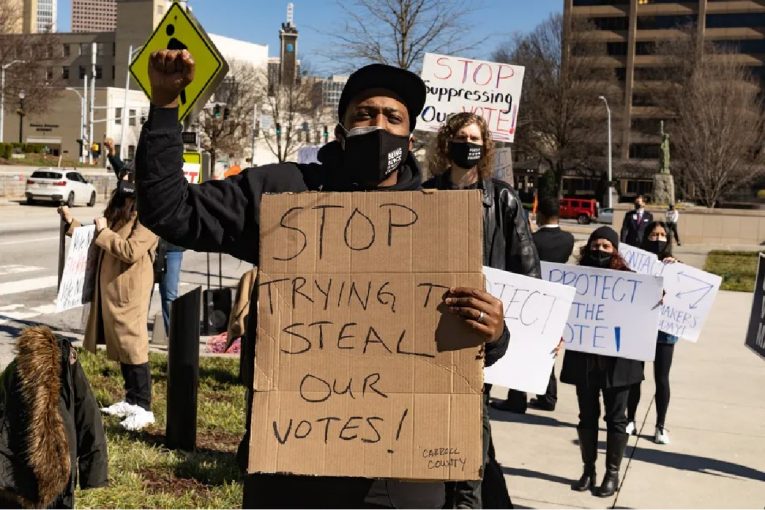

By Julia Asby & Lizet Gonzalez
GEORGIA- “The Election Integrity Act,” or Senate Bill 202, was signed into law by Georgia Gov. Brian Kemp March 25—critics charge it targets and restricts access to voting and it is already facing court challenges that it violates the Voting Rights Act.
SB 202 is facing challenges from organizations that assert it is modern day voter suppression. Republicans, on the other hand, argue that stronger restrictions are necessary to prevent voter fraud.
The NAACP and various other organizations are suing both Secretary of State Brad Raffensperger and members of the State Election Board in an effort to prevent them from enforcing SB 202, asserting the measure is a violation of Section 2 of the Voting Rights Act.
One of the key provisions of SB 202 (https://www.legis.ga.gov/api/legislation/document/20212022/201121) that is problematic is the provision that allows for the restriction of early voting hours, including Sunday early voting hours.
The NAACP points out that this would disproportionately affect people of color, because they utilize Sunday early voting hours at higher rates than white voters.
Other restrictions in SB 202 include imposing strict ID requirements for voters with absentee ballots and “criminalizing individuals and charitable organizations who provide food and water to voters when they are waiting in line to vote,” said the NAACP.
SB 202 also removes the voting power of the Secretary of State on the State Elections board. The same provision allows the State Election Board to take over control of county election boards.
The groups suing contend that this would result in an unprecedented amount of power being given to the State Elections Board which could result in targeting jurisdictions with large populations of people of color.
Gabriel Sterling, a Georgia Election Official, claims that the push for election reform resulted from disinformation regarding voter fraud in the 2020 Presidential election.
The General Assembly stated that the SB 202 bill was being enacted because during the 2020 election there were many absentee ballots during the voting process in which they believed absentee ballots were not being filled in correctly.
The General Assembly’s primary reasoning behind enacting S.B. 202, was “a significant lack of confidence in Georgia election systems, with many electors concerned about allegation of rampant voter suppression and many electors concerned about allegations of rampant voter fraud,” according the measure.
These claimed occurrences, the bill’s authors state, provided a reason to modify the existing voting processes to prevent voting fraud and increase voter confidence.
However, critics of the legislation charge there wasn’t any evidence that there was any fraud happening in the Georgia presidential race, according to a statewide audit (https://sos.ga.gov/index.php/elections/historic_first_statewide_audit_of_paper_ballots_upholds_result_of_presidential_race).
Secretary of State Raffensperger was quoted on sos.ga.gov that the manual audits done in every Georgia county passed their audits, noting, “Georgia’s historic first statewide audit reaffirmed that the state’s new secure paper ballot voting system accurately counted and reported results.”
Julia Asby is a third year student at UC Davis majoring in Political Science with a minor in Sociocultural Anthropology. She is originally from Sacramento.
Lizet Gonzalez is in her final year at San Francisco State University, majoring in Criminal Justice and Spanish. Born in Acapulco, Mexico, she currently resides in the Bay Area.
To sign up for our new newsletter – Everyday Injustice – https://tinyurl.com/yyultcf9
Support our work – to become a sustaining at $5 – $10- $25 per month hit the link: